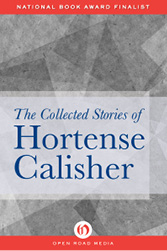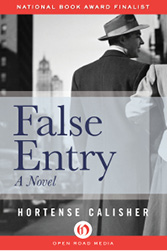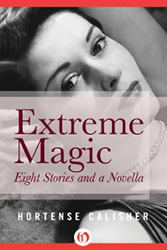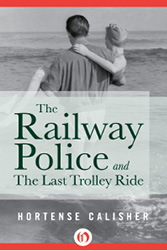Extreme Magic (26 page)
Authors: Hortense Calisher

Lights of cars trickled through the hedge that bordered the highway. The Canal Zone’s powerful guide light, not visible from here, was there to welcome the one car that would be for them. Walking back, they had time for the swift catechism that comes when absolution is near.
“Singled out?” she said.
“It happens.”
“And no one—is to blame?”
“Not—forever.”
“And the ones who are left?” Even in the dark he could see her movement toward the figure lying somewhere inside there. Asleep or dead, the ones with whom one could no longer mesh nerves or spirit, were the same.
“We’re the ones who’ve been left,” he said.
“He was romantic to me once. Maybe he still is. It wasn’t all bad.”
“There’s no need to—throw that away. One’s history.”
Car lights passed, not for them.
“Yours,” she said. “I think Sligo knew it.”
“Mine? Everyone does.”
They reached the dark-browned eaves of the games room.
“But he never said. He didn’t talk.”
And Sligo would have been her only gossip. He recalled now how her glance had followed the women going back into the world from the world of the bar, a glance too proud to take confidences from them, across that bar.
“I thought you must have a special one, from all those Mondays—the quiet ones.” She gave him the thoughtful smile of the isolated. “I thought you must have been married once, that always shows. I couldn’t tell about children; unless people talk about them you can’t tell how they feel about them, in a place like this. But it seemed to me—somehow…that you were dead to…family.”
It moved him beyond reason, that she should have been creeping painfully, a slow but conscientious student, toward this knowledge of him that was so brashly open to the rest of the world.
“That’s why I—” She flung back her head. “—ought to tell you. Children. We never tried not to. There was nothing separately wrong with either of us. I think we must have been like two acids, that could only corrode.” Again her head reared. “But the things I don’t know, I don’t belittle them. And I’m only thirty-four.”
“Mine are dead.” A pale light filtered on her cheeks, those starved flanks. He traced them again, moved toward what he had thought himself never again to be moved. “But I—I can see how you would look in your prime.”
“Ah, you don’t know me,” she said in her tough, blunt way.
It seemed to him that all the brief, successive pictures he had of her were being filled in with a tough central dark criss-crossed with broad black strokes of knowledge that might shift but never fade. “Hard to know.
We’ll
be.” He peered into the games room, in which a floating will-o’-the-wisp of light fancied a surface now and there to stencils of darkness, circles of knives. He turned back to her. “We’ll be strange enough for each other. We’re the extreme.” From which the single-legged, each to each, may still take heart.
“I thought—” She put out a hand. “The quick way you got on to the hospital. You—have friends there, perhaps?”
“Yes, I have friends there,” he said. “Many friends.”
She took his hand at once. Standing backed against the old house, they stared into the blind current of the river, and beyond it, into a current wider than it or any harbor, into that vast multiplicity where there might be no sure order of good or evil, but surely a movement, too wide even for unease, too irrational, of which both of them knew. He knew it was there, this force that had flung him out, and drawn or flung him in again, this movement which, like some god of unbelievers, which did not bear thinking of or speaking to, both took away, took away—and gave. This was nothing to make either a religion or an unfaith of; it was merely the doctrine, not to be palmed onward, which lived somewhere in the tough, central dark of those to whom it had happened. For extreme cases there was sometimes—an extreme magic. It could be merely a falter, a pause in that vast territory which humans could never persuade themselves was not human, one of those illuminated moments when unseen kinships brushed one like lepidoptera passing, when birds flew south from a north they did not see as misery, and in a clearing, his own clearing, a man came upon rabbits, paws lifted to the quiet of evening, staring at Mecca.
“So we can go,” she said. “Where?”
He pointed, to that spot on the dark where a barn which was not to be seen behind its fan of trees, not even when the leaves were down in winter, now lighted up the dark for him like the bush in the Bible. In the conflagration he’d never dared hope for, his house was burning, though no one else could see it, and because he’d got here on time, it was not consumed.
When the long car that was for them turned in and bore down upon them, it came down the lane with normal slowness, not nemesis, nor yet a miracle. Its revolving dome-light bypassed the night skies, stood the trees at stage-green attention, swept white the gravel and swiveled to rest on the Canal Zone. The old inn returned the light like a stockade from another century, indifferent to either. Pointed at it, the long hood of the car seemed to him a hold in which he could see the stored lives of all those in hospitals, each life regularized round its one small hole of the possible, like those prints in which if one looked hard enough one could always see somewhere the upside down V of Fujiyama. It even crossed his mind to wonder where they might be sending Sligo, into or out of what sphere.
They walked straight into that treacherous glare.
There came back to him again how it felt to be only half-alone—in all its separate lights and darks. Once inside the double dream, one no longer tallied these, or no longer dared.
“But I don’t know you,” she said. “You don’t need me.”
“No,” he said. “You don’t know me.”
“You’re sure? You’re not—you’re not just—”
“No,” he said. “I’m not just saying it.”
Hortense Calisher (1911–2009) was born in
New York City
. The daughter of a young
German
-Jewish immigrant mother and a somewhat older Jewish father from
Virginia
, she graduated from
Barnard College
in 1932 and worked as a sales clerk before marrying and moving to Nyack, New York, to raise her family. Her first book, a collection of short stories titled
In the Absence of Angels
, appeared in 1951. She went on to publish two dozen more works of fiction and memoir, writing into her nineties. A past president of the
American Academy of Arts and Letters
and of
PEN
, the worldwide association of writers, she was a
National Book Award
finalist three times, won an
O. Henry Award
for “The Night Club in the Woods” and the 1986
Janet Heidinger Kafka Prize
for
The Bobby Soxer
, and was awarded
Guggenheim Fellowships
in 1952 and 1955.
All rights reserved, including without limitation the right to reproduce this ebook or any portion thereof in any form or by any means, whether electronic or mechanical, now known or hereinafter invented, without the express written permission of the publisher.
This is a work of fiction. Names, characters, places, events, and incidents either are the product of the author’s imagination or are used fictitiously. Any resemblance to actual persons, living or dead, businesses, companies, events, or locales is entirely coincidental.
ACKNOWLEDGMENTS
Some of the stories in this collection have appeared previously in the following magazines and acknowledgment is gratefully made for permission to use them here:
“Il Plœ:r Dã Mõ Kœ:r” originally appeared in
The New Yorker
, 1956.
“Two Colonials” originally appeared in
Harper’s Bazaar
, 1957.
“A Christmas Carillon” originally appeared in
Harper’s Magazine
, 1953.
“The Rabbi’s Daughter” is reprinted from
Charm,
1953.
“Little Did I Know” originally appeared in
The Saturday Evening Post
, 1963.
“Songs My Mother Taught Me” originally appeared in
Harper’s Bazaar
, 1959.
“If You Don’t Want To Live I Can’t Help You” is reprinted by permission of
Mademoiselle
, 1954.
Copyright 1953, 1954, © 1956, 1957, 1959, 1964 by Hortense Calisher; copyright © 1963 by the Curtis Publishing Company
Cover design by Kelly Parr
978-1-4804-3739-5
This edition published in 2013 by Open Road Integrated Media, Inc.
345 Hudson Street
New York, NY 10014







